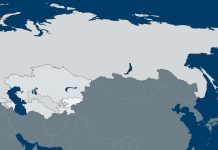Last weekend, I had the opportunity to speak to some Poles. I won’t pretend that they speak for the entire country, but my impression is that, broadly speaking, they believe a peace agreement with Russia would be a mistake. It is to be understood that many Polish people are both passionate about the subject of Russia and not directly militarily involved in the Ukraine war. Poland has provided some weapons and supplies, of course, and some Poles have chosen to enter the fight, but as a nation Poland is riveted by a war it is largely outside of.
Poland has two historic enemies: Germany and Russia. For more than a century, one (and sometimes both) threatened the country’s very existence. The German question was answered by World War II, but that conflict nonetheless resulted in Russian occupation, which lasted until the fall of the Soviet Union. Poland has thus been conditioned to distrust good fortune. The United States has guaranteed Poland’s security, placing increasing numbers of troops within its borders, yet the Poles are not at ease. Partly that’s because Washington has its own interests there, and history has taught Poland that those who do not attack you either betray you or let you down.
It’s unsurprising, then, that Poland was prepared to act in Ukraine at the outset of the conflict, and that it was disappointed when the Americans prevented them from doing so. (Washington didn’t want the war to spread anywhere else, and it didn’t want Moscow feeling more paranoid than it ordinarily does.) It’s also unsurprising that Poland doesn’t want a peace agreement. Warsaw sees this as a historic moment for Ukraine, and Kyiv’s supporters, including Poland, can use Russian weakness as an opportunity to break Russia militarily and secure Poland for generations to come. For them, the errant missile fire last week was a reminder of the threat Russia still poses.
In my opinion, this is neither militarily possible nor politically wise. The force committed to combat Russia is limited to Ukraine. The Ukrainian military has been fighting for its homeland – always a good motivator – and has been on the strategic defensive. The Russians have been on the offensive, which means their supply line is increasingly stretched and fragile as the army advances. More, extended offensive operations on multiple axes create command and control difficulties. Ukraine’s supply lines have been less stressed, and control of Ukrainian forces has thus been less strained but more effective. (This is to say nothing of the parallel U.S. supply lines.) As a result, the Ukrainians have paid a high price but have been rewarded. The Russians have paid a high price but with fewer rewards. Even then, the Russians have not been defeated. Moving into a strategic offensive posture will not yield the kinds of success Ukraine has had on the strategic defense. Attacking Russian forces in a defensive posture could readily lead to failure.
Poland may be willing to throw its military into the fray, but the Polish army is inexperienced and untested, and it depends on the United States for many critical supplies. Washington, for its part, is not interested in adopting an offensive posture. Its strategy is to keep Ukraine as a buffer zone between Russia and Europe – one designed to prevent a European war or even a new cold war. It therefore wants to avoid Russian occupation there without committing American forces to combat. If Ukrainian forces fail to hold their country, the U.S. has other military options, but Ukraine is absolutely its preferred first line of defense.
One option Washington does not have is to break the Russian army permanently. It simply lacks the resources and the will. The Russians have performed poorly in a foreign county, but it must be assumed they would fare better defending their home turf. Breaking Russia’s military demands deep penetration into Russia, and the U.S. is not going to use its military on an action that is likely to fail, let alone one that could trigger a nuclear scenario. (Not for nothing, an advance into Russia would be strategically faulty. If the attacking force were broken, a new westward thrust could work as it absorbs supplies and manpower.)
Politically, the invasion of Ukraine imposed costs on Russia, and though public opinion varies greatly, the people generally do not see the conflict as a necessary one. Attacking Russia would create political unity where there otherwise isn’t any, and the political goal should be to create dissonance. The current disagreement there has weakened Russia’s motivation to fight. Forcing Russians to fight outside the country will likely maintain that division, whereas taking the fight to Russia could have the opposite effect.
Forcing the Russians into an offensive posture has both military and political benefits. At a time when Russia appears internally fragmented and Ukraine is increasingly capable, the greatest danger is to assume that prior successes mean future success, a disease military success frequently causes.
If Moscow were forced into a peace treaty, the benefit to the West is political. A cease-fire raises questions about the prudence of the government and the competence of its military. Given that breaking the Russian army on the whole is a non-starter, a peace agreement creates a political force in Russia that must be allowed to mature. The risk of pursuing a broad victory is too high, much higher than the danger of peace. But President Vladimir Putin understands this equation too, so high-profile Russian losses inside Ukraine are key to his losing control.





 2025 Forecast: The World Without an Anchor
2025 Forecast: The World Without an Anchor